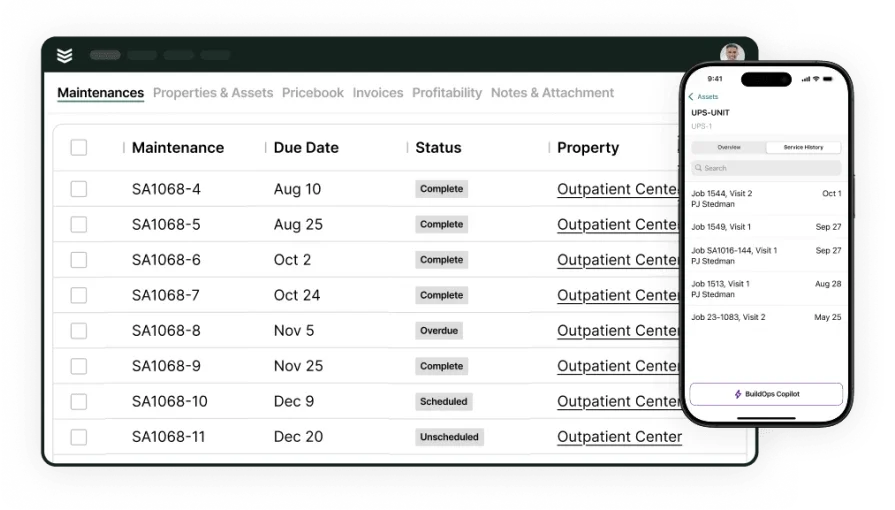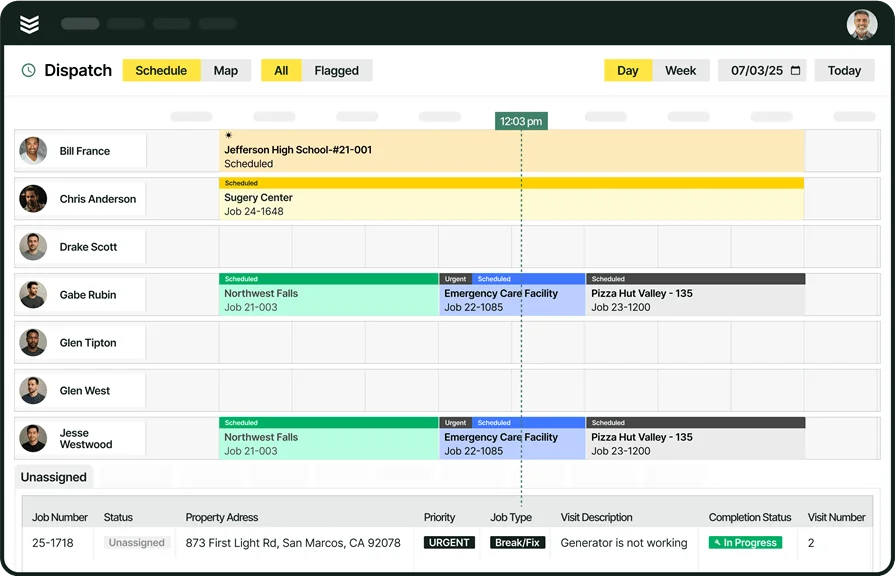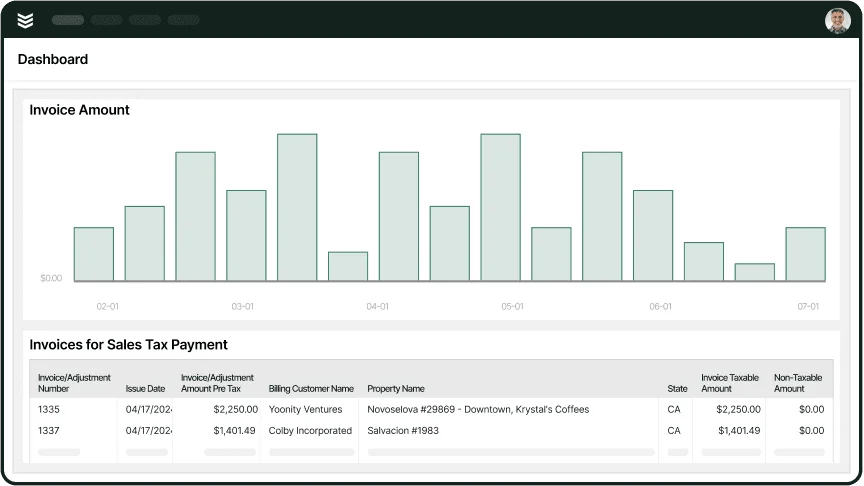In the world of field service management, staying organized and keeping operations running smoothly is the key to success. Managing technicians, scheduling jobs, and ensuring customer satisfaction can be overwhelming without the right tools. That’s where FSM software makes a difference for field service managers. It streamlines processes, improves communication, and helps managers take control of day-to-day operations without the usual chaos.
This guide is built for field service managers who rely on software to keep their teams productive. We’ll cover everything you need to know—from evaluating software quality to the must-have features and the best platforms for different types of businesses.
- How does a field service manager evaluate quality software?
- What does a successful field service manager do?
- 7 features field service managers should look for in FSM software
- 8 best field service manager software
- 3 important field service manager software FAQs answered
With so many software options available, it’s easy to get lost in flashy features and sales pitches. But the real question is—does it actually help you run your team more efficiently? The right software should fit seamlessly into your workflow, not make things more complicated. Now, let’s break down what field service managers should look for when evaluating quality software.
How does a field service manager evaluate quality software?
Choosing the right field service manager software isn’t just about picking the one with the longest feature list. It’s about finding a tool that actually improves efficiency, keeps your team connected, and helps you stay on top of every job without the usual headaches. Before making a decision, field service managers need to ask the right questions to identify the right benefits of field service management software.
- Reliability in the field – Can this software handle real-time updates without lagging when my team is out on job sites? Will it keep running when there’s weak internet or no service?
- Ease of use – Can my technicians clock in, access job details, and update work orders from their phones without confusion? How much training will they need to get up to speed?
- Scheduling & dispatch efficiency – Does the system make it easy to assign jobs based on technician availability, skill set, and location? Can I adjust schedules quickly when last-minute changes happen?
- Integration with daily operations – Does it sync with our invoicing, inventory, and GPS tracking tools, or will I be stuck entering data manually? Will it help me reduce paperwork and streamline reporting?
- Real-world features for field management – Does it offer automated job tracking, real-time technician updates, and customer notifications? Will it actually help me reduce no-shows and miscommunications?
Next, let’s take a closer look at what makes a field service manager truly successful.
What does a successful field service manager do?
A successful field service manager keeps jobs on schedule, ensures technicians have what they need, and maintains clear communication between the field and office. They use tools that help them track job progress, optimize routes, and reduce downtime—ensuring every job is done right the first time.
To excel, a manager must anticipate scheduling conflicts, balance workloads, and keep customer expectations in check. The right field service management software helps automate these tasks, giving managers real-time visibility into operations so they can make informed decisions on the fly.
7 features field service managers should look for in FSM software
The right field service management software isn’t just about keeping things organized—it’s about helping managers stay ahead of scheduling conflicts, team coordination, and job tracking. Here are seven must-have features every field service manager should look for.
1. Smart scheduling & dispatching
A scheduling system that assigns jobs based on technician availability, skill set, and location is essential. When last-minute cancellations happen, a field service manager needs a system that can quickly adjust assignments without disrupting the entire day’s workflow. The right field service scheduling software ensures real-time updates, automated job assignments, and better resource management.
2. Real-time GPS & fleet tracking
Knowing where your technicians are at all times helps prevent wasted trips and improves response times. If a high-priority job comes in, a field service manager can instantly reroute the nearest available technician instead of relying on calls or manual check-ins. Using fleet tracking software ensures efficient route planning, fuel savings, and better technician accountability.
3. Integrated CRM for customer management
Keeping customer details, job history, and service requests in one place streamlines operations. If a client calls about a past job, a field service manager shouldn’t have to dig through old records. A field service CRM system provides instant access to service history, previous quotes, and contact details, ensuring a smooth customer experience.
4. Technician mobile app
Field technicians need instant access to job details, checklists, and customer notes while on-site. Without a mobile solution, they rely on phone calls or outdated paperwork, leading to miscommunication. A dedicated field service app for technicians lets teams update job statuses, capture photos, and collect digital signatures in real-time.
5. Automated time tracking
Tracking work hours manually leads to payroll errors and lost billable hours. A field service manager needs an automated way to monitor shifts, overtime, and job durations. With field service time tracking software, managers ensure accurate payroll processing, prevent time theft, and keep labor costs under control.
6. Service agreements & preventative maintenance
Recurring service contracts keep revenue predictable, but managing them manually is a nightmare. If a field service manager loses track of contract renewals or maintenance schedules, clients could turn elsewhere. A service agreement management tool gives field service managers the benefit of automating reminders, tracking contract terms, and ensuring no renewal slips through the cracks.
7. Detailed reporting & analytics
Without data, a field service manager is working blind. Understanding technician performance, job completion rates, and revenue trends helps make informed decisions. Field service reporting software provides real-time insights, allowing managers to optimize workloads, cut unnecessary costs, and improve overall efficiency.

Check out our service management suite
See how BuildOps helps field service managers keep crews aligned.
8 best field service manager software
Choosing the right software can make or break your operation. The best tools help field service managers keep schedules tight, crews organized, and jobs running smoothly—without unnecessary headaches. Whether you're managing a commercial fleet or handling residential service calls, these eight solutions offer options tailored to different needs.
1. Best for commercial: BuildOps
BuildOps is designed specifically for commercial contractors, offering an all-in-one platform that streamlines scheduling, dispatching, and reporting. Its real-time tracking and seamless integration with other business tools ensure efficient job management and technician coordination, making it ideal for growing commercial operations.
How Pricing Works: We offer live demos weekly, and you can request one whenever it suits you best. This will enable you to explore the features and choose the best solution to meet your requirements.
What Sets It Apart for FSM Managers: BuildOps was built for commercial field service operations—no fluff, just the tools that matter. With real-time scheduling and dispatching, advanced work order management, and automated invoicing and payments, managers get full visibility into every job. Track technician progress, manage service agreements, and generate detailed reports—all from one powerful platform. No guesswork, just results.

Curious how BuildOps works?
Get a firsthand look at how we help teams manage jobs, technicians, and operations.
2. Best for residential: Housecall Pro
Image Source: Housecall Pro
Housecall Pro is a user-friendly platform designed for residential service businesses. It offers online booking, customer notifications, and automated invoicing, making it a solid choice for home service professionals. Businesses that require advanced enterprise-level reporting or highly customizable workflows may find it restrictive. Its features are great for smaller teams, but larger operations might struggle with a lack of deep analytics, limited multi-location client management, and fewer options for custom automation and integrations compared to more robust platforms.
How Pricing Works: Housecall Pro follows a tiered subscription model, starting at around $65/month for basic features, with more advanced tools available in higher-priced plans.
What Sets It Apart for FSM Managers: Its easy-to-use interface and automation features make managing residential jobs more efficient while reducing admin work.
How It Stacks Up Against BuildOps: See for yourself, when we compare Housecall Pro & BuildOps side-by-side
3. Best for general contractors: Jobber
Image Source: Jobber
Jobber is built for small-to-midsize general contractors, offering scheduling, quoting, and invoicing in one platform. It’s a great tool for businesses looking for an all-in-one solution, though it may lack the depth needed for highly specialized commercial contractors. While it excels in basic scheduling, quoting, and invoicing, it lacks advanced job costing, deep customization, and enterprise-level integrations that larger or more specialized contractors may require for full operational control.
How Pricing Works: Jobber offers multiple pricing tiers, starting at around $69/month, with additional features available in higher plans.
What Sets It Apart for FSM Managers: Jobber’s strong mobile app and straightforward scheduling system help managers keep jobs organized without a steep learning curve.
4. Best for small businesses: ServiceFusion
Image Source: Service Fusion
ServiceFusion is a budget-friendly field service management software designed for small businesses that need essential scheduling, dispatching, and invoicing tools without a steep learning curve. It’s great for companies looking to streamline operations at an affordable price. However, this software makes it challenging for businesses that require advanced reporting, integrations, or complex job costing.
How Pricing Works: ServiceFusion offers a tiered pricing model starting at around $125/month, with higher plans including more automation and customization options.
What Sets It Apart for FSM Managers: Small business owners benefit from its straightforward interface, automated invoicing, and real-time dispatching, helping them manage daily operations without extra admin work.
Deep Dive
To learn more about what’s best for contractors who are just starting, check out this comprehensive guide to the best FSM software for small businesses.
5. Best for independent contractors: FieldPulse
Image Source: FieldPulse
FieldPulse is designed for independent contractors who need an easy-to-use field service management software without the complexity of enterprise-level tools. It offers job scheduling, invoicing, and customer management—all from a mobile-friendly platform. However, those managing larger teams may find it lacks advanced dispatching and reporting features.
How Pricing Works: FieldPulse offers a tiered pricing structure, starting at around $99/month for a single user, with additional costs for extra team members and advanced features.
What Sets It Apart for FSM Managers: Independent contractors benefit from its simple, all-in-one platform that handles scheduling, estimates, and payments—without unnecessary overhead.
How It Stacks Up Against BuildOps: Find out in our head-to-head comparison of FieldPulse vs BuildOps here
6. Best for mid-sized businesses: ServiceTrade
Image Source: ServiceTrade
ServiceTrade is tailored for midsize field service companies seeking to enhance scheduling, dispatching, and customer communication. It offers features like automated job tracking and digital customer engagement tools. However, businesses requiring built-in accounting functionalities or extensive customization options might find the software limiting for their operations.
How Pricing Works: ServiceTrade provides customized pricing based on the specific needs and size of the business, with plans that are to be requested.
What Sets It Apart for FSM Managers: Midsize businesses benefit from its focus on improving operational efficiency and customer interactions, ensuring a seamless service experience.
7. Best for fast-growing businesses: ServiceM8
Image Source: ServiceM8
ServiceM8 is designed for rapidly expanding field service companies that require scalable solutions without added complexity. It provides job scheduling, invoicing, and customer communication through an intuitive mobile app. However, enterprises needing complex reporting or deep inventory management might find it less comprehensive.
How Pricing Works: ServiceM8 operates on a pay-per-job model, starting at approximately $29/month, with higher-tier plans offering additional automation and team management features.
What Sets It Apart for FSM Managers: Growing businesses appreciate its user-friendly interface, real-time job tracking, and automated customer reminders, facilitating efficient scaling.
8. Best for budget-friendly option: Kickserv
Image Source: Kickserv
Kickserv offers an affordable field service management software solution for businesses seeking essential job tracking and invoicing features. It includes scheduling, customer history, and payment processing without the expense of more advanced platforms. However, companies requiring custom workflows or detailed analytics will be limited in their operations.
How Pricing Works: Kickserv's pricing plans are based on the number of users. The entry-level Flex plan is priced at $19/month for up to 3 users, making it a cost-effective choice for small teams. Higher-tier plans accommodate more users and offer additional features.
What Sets It Apart for FSM Managers: Budget-conscious managers benefit from its straightforward scheduling, integrated invoicing, and QuickBooks compatibility, ensuring smooth operations without overspending.

Get the software scoresheet
Compare tools at a glance with our easy-to-use software scoresheet.
3 important field service manager software FAQs answered
Field service managers juggle schedules, teams, and customer demands daily, so having the right field service management software is critical. But with so many options and features, questions arise. Below, we tackle three of the most common concerns field service managers have when choosing and using FSM software.
1. How does a field service manager integrate tech into operations?
The best way to integrate technology is by choosing field service management software that automates repetitive tasks and connects the office with the field. A strong FSM system should sync schedules in real-time, provide mobile access for technicians, and streamline invoicing and reporting, eliminating the need for paper-based processes.
2. How does a field service manager know when to build vs. buy?
Building custom software may seem appealing, but it’s a massive time and resource investment. Buying field service management software is often the better choice because it’s already tested, supported, and updated regularly. A pre-built solution offers instant deployment, seamless integrations, and scalability, while building from scratch requires the business to have additional ongoing maintenance and development costs.
3. How do I evaluate the cost of field service manager software?
The cost of FSM software depends on features, scalability, and the savings it creates. Automation reduces admin workload, minimizes scheduling conflicts, and improves technician efficiency—leading to lower labor costs and fewer missed jobs. Instead of focusing just on price, managers should evaluate ROI by considering time saved, reduced errors, and overall job completion rates.
The right field service management software makes all the difference. It keeps jobs on track, technicians in sync, and customers happy—without managers having to chase down details or put out fires all day. But not all FSM software is built the same. The key is finding a platform that works how you work, whether that means seamless scheduling, real-time reporting, seamless invoicing & payments, or automation that actually saves you time.
That’s where BuildOps comes in. Unlike most tools, it brings everything—dispatching, invoicing, job tracking, and reporting—into one system built for commercial contractors. No patchwork solutions, no wasted time switching between apps—just one powerful platform that helps you manage it all.

Take a closer look at BuildOps
We help field service teams work smarter, faster, and more profitability.







